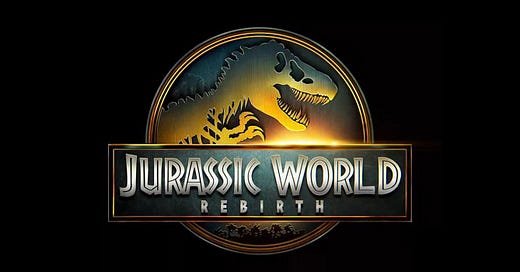Movie Review: Jurassic World: Rebirth – A Franchise Reawakens, But Does It Roar?
Visually arresting, narratively cautious—evolution stalled in the shadow of its ancestors.
In Jurassic World: Rebirth, the seventh installment in the dino-saga and the first true reboot since Jurassic World Dominion, director Gareth Edwards (Rogue One, Godzilla) attempts to breathe new life into a franchise that’s been lumbering under the weight of its own legacy. With a fresh cast, a stripped-back setting, and a return to practical suspense, Rebirth is both a nostalgic homage and a cautious step forward. But does it truly evolve, or is it just another fossil in the making?
Set five years after the events of Dominion, the world has largely moved on from dinosaurs. Once a global threat, the creatures have mostly died off due to climate change and pollution, surviving only in a narrow equatorial band where conditions remain hospitable. Dinosaurs, once the stuff of nightmares and wonder, are now background noise—hoisted from rivers, fenced into reserves, and ignored by a jaded public. That’s the world we enter through the eyes of Dr. Henry Loomis (Jonathan Bailey), a paleontologist whose museum is closing due to lack of interest. His quiet resignation is interrupted by a call to adventure: a covert mission to retrieve DNA from three legendary dinosaur species—land, sea, and air—that may hold the key to curing heart disease.
The mission is funded by Martin Krebs (Rupert Friend), a slick pharmaceutical executive with dollar signs in his eyes. He recruits Zora Bennett (Scarlett Johansson), a hardened ex-mercenary, and Duncan Kincaid (Mahershala Ali), a stoic boat captain with a tragic past. Together with a ragtag crew, they head to a remote island—once an InGen research facility—now overrun with mutated dinosaurs and abandoned secrets. Along the way, they rescue a shipwrecked family, adding a second narrative thread that echoes the franchise’s tradition of putting children in peril.
Visually, Rebirth is a marked improvement over its predecessors. Edwards trades the glossy digital sheen of Fallen Kingdom and Dominion for a more tactile, analog aesthetic. The cinematography by John Mathieson (Gladiator, Logan) captures the island’s lush, dangerous beauty with sweeping jungle vistas and moody lighting. The dinosaurs, especially the new hybrid “Distortus Rex”—a grotesque, six-limbed mutation with a xenomorph-like skull—are rendered with a mix of practical effects and restrained CGI. A standout sequence involving a Mosasaurus capsizing a sailboat is pure Spielbergian suspense, while a cliffside infiltration of a temple guarded by winged predators channels Indiana Jones with a prehistoric twist.
But for all its visual flair, Rebirth struggles with tone and character. David Koepp, returning to the franchise after co-writing Jurassic Park and The Lost World, delivers a script that’s heavy on exposition and light on emotional depth. The dialogue is peppered with quips that often fall flat, and the characters—while capably performed—feel underwritten. Johansson’s Zora is stoic to a fault, Bailey’s Loomis is charming but one-note, and Ali’s Duncan hints at a richer backstory that never fully materialises. The family subplot, featuring Manuel Garcia-Rulfo and Luna Blaise, adds heart but also dilutes the tension by splitting the narrative focus.
Thematically, the film flirts with big ideas—corporate greed, the ethics of genetic manipulation, the commodification of life—but never fully commits. The pharmaceutical angle is timely, but it lacks the philosophical weight of the original Jurassic Park, which grappled with chaos theory and the hubris of playing God. Instead, Rebirth often feels like a greatest-hits compilation: a bit of Jaws here, a dash of Aliens there, a nod to Temple of Doom—all entertaining, but rarely transcendent.
Still, there are moments of genuine awe. A quiet scene where Loomis watches a Titanosaurus mating ritual evokes the wonder of Spielberg’s 1993 classic. A baby Aquilops named Dolores, adopted by one of the children, provides a rare moment of tenderness. And the film’s final act, which pits the team against the monstrous D. rex in a crumbling lab, delivers the kind of high-stakes spectacle fans crave.
In the end, Jurassic World: Rebirth is a mixed bag. It’s better than the last two entries, thanks to Edwards’ direction and a more grounded approach. But it’s also burdened by franchise fatigue, tonal inconsistency, and a reluctance to truly innovate. It’s a film caught between reverence and reinvention—too respectful to break new ground, too cautious to fully soar.
Rating: ★★★☆☆ (3 out of 5)
Jurassic World: Rebirth is a visually striking, occasionally thrilling reboot that reminds us why we fell in love with dinosaurs in the first place. But it’s still chasing the shadow of its ancestors. A decent popcorn flick, but not quite the evolutionary leap the franchise needs.






LOVED this ❤️